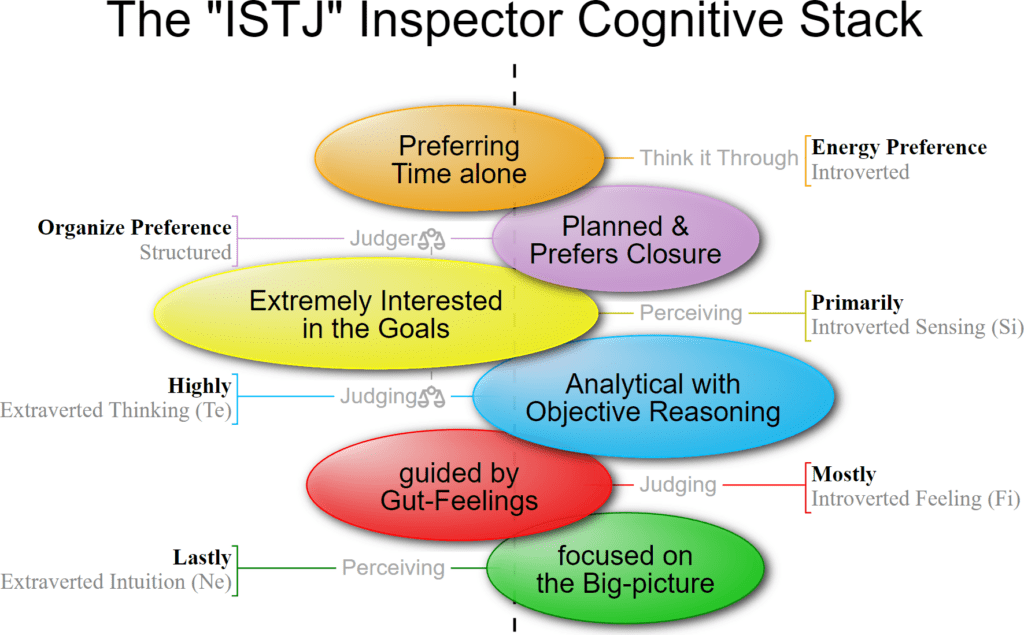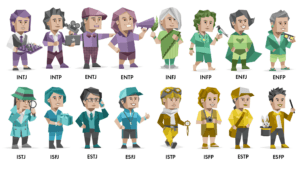What is the MBTI ISTJ “Inspector” Personality Type?

People with an ISTJ Personality Type tend to be reserved, practical, and quiet. They are well organized at work, home, and family.
Inspectors are goal-oriented and have great concentration powers. They are logical, realistic, dependable, and will take responsibility for their actions. They value loyalty in themselves and others and emphasize traditions.
With Introverted Sensing as their dominant function, Inspectors like to organize the facts and are goal-oriented.
With extroverted thinking as their principal extraverted function, inspectors are Judges and use objective reasoning when making decisions.

Inspectors, with their introverted feelings, will go with their gut feeling and focus more on the big picture, with their Extraverted Intuition as their lowest function.
Inspectors are introverted, preferring time alone to think things through. They are structured, like to plan, and prefer closure.
Inspectors are “Concrete Judgers” with Introverted Sensing and Extraverted Thinking. They will disapprove of you in detail when threatened. And may behave in the Blammer Satir communication style.
ISTJ Personality Type cross-reference
- Keirsey Type – Inspector
- Temperament Type – Melancholy
- Animal Type – Beaver
- DISC Type – Compliant
- Socio-Communicative Type – Analytical
- True Colors – Gold
- Color Code – White
- Personality Compass – East
- Occupational Type – Realistic
- Learning Type – Pragmatist
- Leadership Type – Avoider
Enneagram Types
The Enneagram is a Personality Typing System comprising nine different types.

Dominant Function – Introverted Sensing
- Introverted sensors are focused on the present moment, taking in much information about their surroundings.
- They also have vivid memories of the past and rely on the memories of these experiences to form expectations for the future.
Auxiliary Function – Extraverted Thinking
- They are logical and efficient. They enjoy looking for rational explanations for events.
- They prefer focusing on details rather than abstract information.
- Being efficient and productive is essential for people with this personality type.
- They appreciate the knowledge with immediate, practical applications.
- They make decisions based on logic and objective data rather than personal feelings.
Tertiary Function – Introverted Feeling
- They often make personal interpretations based on their values as they make judgments.
- This is often described as an “instinct” or “gut feeling” about a situation.
- They might decide based on logic, only to have this feeling kick in, telling them to trust their feelings rather than just the facts.
Inferior Function – Extraverted Intuition
- This aspect of personality enjoys new ideas and experiences.
- This is the weakest part of the ISTJ’s personality, but developing this function can sometimes lead to a more balanced character.
ISTJ Traits
ISTJs are loyal, logical, realistic, and responsible but will generally keep to themselves until approached.
The primary function of the ISTJ is Introverted Sensing, which means they like things to be quantifiable.
The auxiliary function is Extraverted Thinking, so the ISTJ will willingly speak if only data is to be presented; otherwise, they will remain silent.
They work with facts, take a systematic approach to solving problems, and prefer to follow established rules and procedures. Sometimes, their desire to maintain structure can seem rigid and unyielding.
Strengths
- Detail-oriented
- Realistic
- Present-focused
- Observant
- Logical and practical
- Orderly and organized
Weaknesses
- Judgmental
- Subjective
- Tends to blame others
- Insensitive
ISTJ Relationships
Friendships
- They tend to get along best with similar friends.
- While they tend to be a bit serious, and by the book, they like to have fun.
- They might not be willing to jump into new things, but you can be a great friend by helping them pursue hobbies and activities they enjoy.
Personal Relationships
- They prefer spending time alone or with small groups of close friends.
- People with this personality type are usually very loyal and devoted to family and friends but may struggle to understand their own emotions and the feelings of others.
- They can be pretty reserved and sometimes fail to pick up on the emotional signals given by other people.
- However, once they are close to a person and understand that person’s feelings and needs, they will exert much effort to support those needs.
Partner Relationships
- While they may experience deep feelings, they often struggle to show that side of themselves in romantic relationships.
- They can be an understanding partner. But do not expect them to bear their soul immediately.
- Sometimes, it may seem that your partner is not considering your feelings. Still, you can help them see your side by rationally presenting facts and logical explanations for your side of the argument.
Parenting
- ISTJ parents tend to be focused on tradition and are good at providing security and stability to their children.
- Children of ISTJ parents often find that their parents will treat them with care and respect and that they also expect the same treatment in return.
- Parents of ISTJ children will find that providing consistency can help their children feel more secure.
- Sticking to routines, introducing change slowly, and giving them time to adjust to new situations are all ways to help an ISTJ child.
ISTJ Careers
- Because of this need for order, they tend to do better in learning and work environments with clearly defined schedules, clear-cut assignments, and a strong focus on the task.
- When learning new things, ISTJs do best when the material is something they view as applicable to real-world applications.
- Concrete, factual information appeals to ISTJs, while theoretical and abstract knowledge has little value unless they can see some practical use.
- While they may exert tremendous energy into projects they consider valuable, they will avoid wasting time and energy on things they consider useless or unpractical.
- ISTJs tend to do well in careers that require order, structure, and perseverance.
- Jobs involving concrete facts and figures (accounting, library science, computer programming, etc.) are all good options.
- Jobs that require accuracy, respect for rules, and stability often appeal to those with an ISTJ personality.


